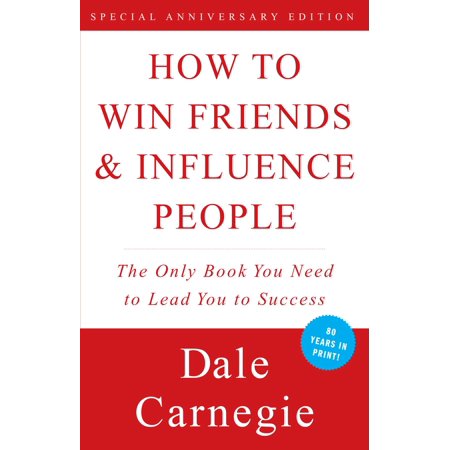Timeless Principles in a Social World: From How to Win Friends and Influence People by Dale Carnegie
/How to Win Friends and Influence People by Dale Carnegie
Some ideas stand the test of time because they tap into something profoundly true buried deeply in human nature and even nature itself. Nearly a century ago, Dale Carnegie published How to Win Friends and Influence People, well before the boom of self-development and communication literature flooded the modern marketplace. His simple but incisive insights for dealing with people have sold more than 15 million copies worldwide, defined an entire genre of content, and been considered by Time Magazine and many other sources (even the Library of Congress), to be one of the most influential books in American history, and even all-time.
Much of Caregie’s work was birthed from his belief that it is possible to change other people’s behavior by changing one’s behavior towards them. In a social world of unprecedented connectedness fueled by communication technology and mass media, these principles are as important and potent as ever. Never before in human history has it been possible for nearly limitless instantaneous interactions with people across the world, so here is a reminder of some ideas for dealing with people that may just change their behavior, and your life for the better:
Review: How to Win Friends and Influence People by Dale Carnegie
Remembering and practicing a long list of principles can be challenging in the busyness of everyday life and the urgency of the moment. Most of the time, our behavior isn’t guided by clear, rational recall of rules and procedures, but by underlying attitudes shaped by our values and beliefs that provoke certain types of behavior. A quick Google search will reveal dozens of articles listing and summarizing the book’s core principles in simple order, but this review focuses not just on the principles, but four key attitudes which when practiced and adopted, produces the behaviors that these principles describe.
Part One: Fundamental Techniques in Handling People
Principles:
Don't criticize, condemn, or complain.
Give honest and sincere appreciation.
Arouse in the other person an eager want.
Attitude #1: Empathy -
Many psychologists and communication experts agree that perhaps the greatest indicator of social intelligence is empathy. It is dangerously easy to overestimate our own empathy, and being empathetic is a deeper, more visceral and emotional response than mere sympathy. Sympathy might be understood to mean mere recognition and acknowledgement of another’s perspective or experiences, but empathy means a deeper understanding and awareness of their feelings and perceptions. Sympathy is to feel something for someone, but empathy means to feel it with them.
Empathy is a powerful tool both for understanding people around you, but also making them feel understood. When people feel understood, they can relax their defensive desire to fight for status or rightness, and genuinely open themselves to then understanding you. Fortunately, empathy is not a genetic trait, but a practical skill that can be practiced and grown like a muscle. Seeking to understand people is the route to developing empathy, but showing empathy means also making them feel understood. This does not mean you must agree with a person, but rather it means you must be able to imagine that you could - and why. Showing empathy to those around you will ultimately allow a personal to feel disarmed, appreciated, and open to wanting to understand you in return.
Part Two: Six Ways to Make People Like You
Principles:
Become genuinely interested in other people.
Smile.
Remember that a person's name is, to that person, the sweetest and most important sound in any language.
Be a good listener. Encourage others to talk about themselves.
Talk in terms of the other person's interest.
Make the other person feel important – and do it sincerely.
Attitude #2: Selflessness -
The term selflessness implies quite literally “emptying one’s Self.” In practical terms, it translates to considering another person’s needs and desires before your own. People are intrinsically selfish and most often consumed with their own thoughts, feelings, and desires, therefore to consider another’s needs before your own is an act of sacrifice to satisfy that person first which inspires trust and appreciation. Focusing on others means choosing contrary to our nature to value their needs as if they were your own, which leads them to feel valued, and ultimately to value you for the way you make them feel. Maya Angelou, the famous American poet, author, and civil rights activist once said, “...People will forget what you said; people will forget what you did, but people will never forget how you made them feel.”
Part Three: How to Win People to Your Way of Thinking
Principles:
The only way to get the best of an argument is to avoid it.
Show respect for the other person's opinions. Never say "You're wrong."
If you're wrong, admit it quickly and emphatically.
Begin in a friendly way.
Start with questions to which the other person will answer yes.
Let the other person do a great deal of the talking.
Let the other person feel the idea is his or hers.
Try honestly to see things from the other person's point of view.
Be sympathetic with the other person's ideas and desires.
Appeal to the nobler motives.
Dramatize your ideas.
Throw down a challenge.
Attitude #3: Collaboration -
The irony of this section’s title “How to Win People to Your Way of Thinking,” is that the key to winning people’s minds and hearts is by not competing. Because people are intrinsically selfish, defensiveness is the instinctual response if our ideas or perspectives are challenged. There is an old adage that says “A man convinced against his will is of the same opinion still.” In persuasion, competition puts each party at odds with one another and each with a vested interest in winning. However, approaching people collaboratively vests their interest with yours and aligns your efforts towards a common goal.
Like the first two core attitudes discussed in this article, collaboration involves seeking first to understand then be understood, and considering another’s interests and perspectives before your own. Only by asking questions, listening, and being collaborative can you understand how to align with each other’s interests. To win people’s hearts and minds, you don’t attack them - you attract them. Persuasion is ultimately an art of agreement, not argument.
Part Four: Be a Leader: How to Change People Without Giving Offense or Arousing Resentment
Principles:
Begin with praise and honest appreciation.
Call attention to people's mistakes indirectly.
Talk about your own mistakes before criticizing the other person.
Ask questions instead of giving direct orders.
Let the other person save face.
Praise every improvement.
Give the other person a fine reputation to live up to.
Use encouragement. Make the fault seem easy to correct.
Make the other person happy about doing what you suggest.
Attitude #4: Respect -
Underneath people’s most selfish desires to be right, to be heard, to be understood, is a deeply rooted craving connected to the psyche and very identity of a person - the need for respect. A functional way to understand the difference between respect and the other three core attitudes discussed here is that empathy, selflessness, and collaboration emphasize valuing the needs (thoughts, feelings, desires) of another person, but respect means valuing the person themself. Selflessness, as an attitude discussed above, is an act of humility for the sake of another, but respect is an act of honoring another for their own sake.
Because respect in this sense is not connected to any one event, perspective, or desire, but rather to the person themself, it is a reflection of their perceived identify as a whole, a sort of sum total of how much they are valued. If you ask many questions, let people talk, listen and smile, offer encouragement and warmth, but fail to make them feel respected, it conveys, “I am doing this to be nice,” rather than, “I am doing this because I value you and believe you deserve it.” A failure to show respect negates the sincerity and the intended meaning behind all the other attitudes. This is why respect is one of the cornerstones of treating people how we wish to be treated, and so important to serving as a foundation for the other attitudes. If we can learn and practice empathizing and understanding other people, consider their needs above our own, and interacting collaboratively rather than competitively out of a sincere attitude of basic respect, then winning friends and influencing people is inevitable.
Here’s a link f you’d like to buy the full book on Amazon - How To Win Friends and Influence People by Dale Carnegie.





